 Spring arrived in the Northern Hemisphere and all of Goddess’s children are waking up from our winter slumbers. Birds are singing, fruit trees are blossoming, bees are buzzing, and early spring bulb flowers are in full bloom. Signs of spring fever are evident as we find ourselves full of energy and vitality for new projects and relationships.
Spring arrived in the Northern Hemisphere and all of Goddess’s children are waking up from our winter slumbers. Birds are singing, fruit trees are blossoming, bees are buzzing, and early spring bulb flowers are in full bloom. Signs of spring fever are evident as we find ourselves full of energy and vitality for new projects and relationships.
As new life emerges from the Earth we can more easily reflect on our place in the greater scheme of life. It’s a good time to question the values of our consumer society and ask if there is another way.
In contrast to these values of domination, separation, and consumption, ancient wisdom traditions teach that we are all connected – to each other, to all life, to the whole natural world and to the spiritual cosmos.

One canary in the coalmine that points out the lack of balance we have created with our industrial, military, consumer society is the disappearance and collapse of bee colonies all around the world. This is something that we ignore at our own peril. Without bees we could lose 30% of our food crops.
The relationship between humans and bees dates back to prehistoric days. Cave paintings found in Spain, from between 6000 and 80000 BC, depict our Neolithic ancestors gathering honey from wild bee colonies.
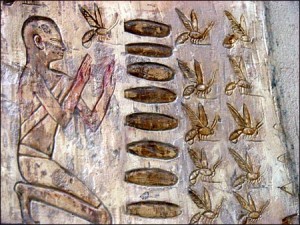
The earliest record of humans keeping bees in human made hives dates back to Egypt of 2400 BC.
The ancients believed that the bees’ ability to make honey was a gift from the divine. Bees who give us their sweet honey, used for food, drink and medicine have long been associated with Goddesses all around the world.
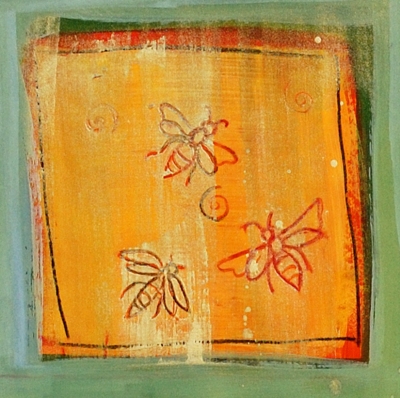
In ancient Egypt the main temple of the Goddess Neith was known as the “House of the Bee.” She was often depicted as a veiled Goddess which perhaps was an allusion to bees, often called hymenoptera meaning “veil winged”. In truth the bees’ wings are beautiful lace-like fluttering veils.
The Greeks, who only knew how to collect wild honey, inherited bee keeping from the Minoans, who worked with and honored bees since the beginning of the Neolithic era. The Great Mother Goddess was often called “Melissa”, meaning “the Queen Bee.” In the myth and imagery of both cultures, associations of the Mother Goddess with the little honeybee are abundant.
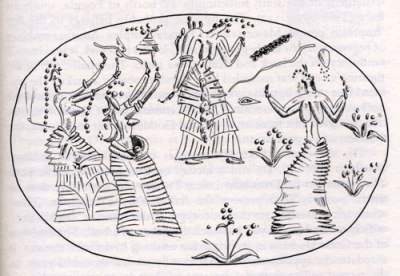
India’s ancient sacred text, the Rig-Veda, contains numerous references to bees and honey. The Indian Bee Goddess, Bhramari Devi, whose name comes from the Hindi word bramari, meaning ‘bees’, is said to make Her home within the heart chakra. Here She emits the buzzing sound of Bees. All across ancient India the humming of bees represented the essential sound of the universe.
Bees are also sacred to the Celtic Goddess Brigid. The ancient Celts believed that Brigid’s bees brought their magical nectar to earth from her apple orchard in the Otherworld. Her power, manifesting through bees, endures through time. A Christianized version of Brigid, Gobnait, protected Her people with the help of bees. She thwarted a band of robbers attempting to steal the people’s cattle, by loosening a swarm of bees on the rustlers, sending them fleeing in terror.
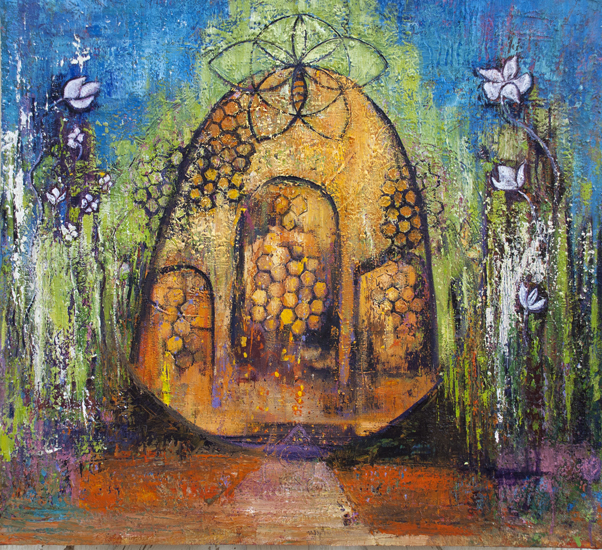
Through working with bees I have learned personally what amazing community organizers they are. The ancients saw bees as beings that create order. Each bee diligently works their part of the community with cooperation and organization, ensuring the welfare of all. Perhaps the early Neolithic people, in whose hearts the Goddess reigned, were inspired by the honeybee to create their own communities on cooperation and harmony. While at the same time bees made the early agricultural societies possible through their work as pollinators of many of our favorite foods. Like the honeybee, the modern day Way of the Goddess is one that honors a balanced approach to living in nature; an approach that honors cooperation, harmony and work well done.
Now that spring has arrived, I rejoice in the return of the honeybees to my garden and in the magic of new life as it emerges from the dark, fertile Earth. The Bee Goddess calls us all to remember that through loving cooperation, focus and hard work, we can produce life’s sweet nectar.
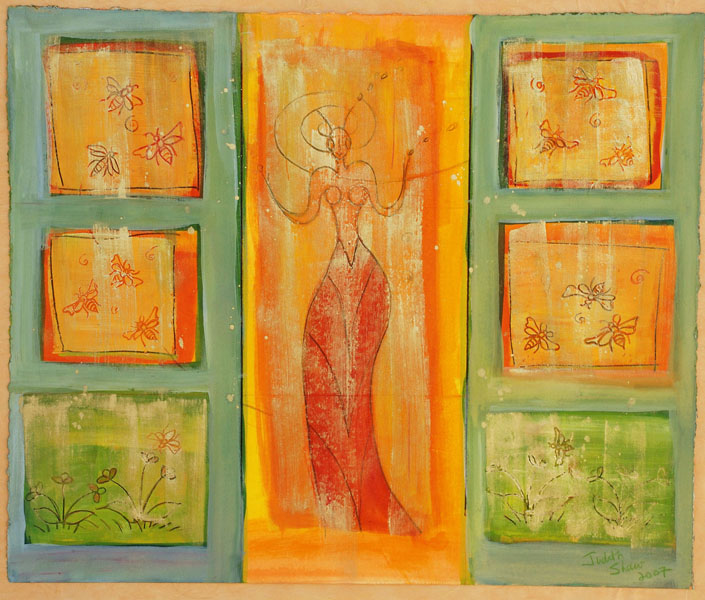
References: The Goddesses and Gods of Old Europe by Marija Gimbutas, http://mirrorofisis.freeyellow.com/id576.html, http://barnsleybeekeepers.org.uk/history.html , http://marafreeman.blogspot.com/2011/08/what-druids-knew.html , http://romancingthebee.com/2012/05/13/the-bee-as-symbol-of-the-divine-mother/
Judith Shaw, a graduate of the San Francisco Art Institute, has been interested in myth, culture and mystical studies all her life. Not long after graduating from SFAI, while living in Greece, Judith began exploring the Goddess in her artwork. She continues to be inspired by the Divine Feminine in all of Her manifestations. Originally from New Orleans, Judith now makes her home in New Mexico where she paints and teaches part-time. She is currently hard at work on a deck of Goddess cards. Her work, which expresses her belief in the interconnectedness of all life, can be seen on her website at http://judithshawart.com
Judith’s deck of Celtic Goddess Oracle Cards is available now. 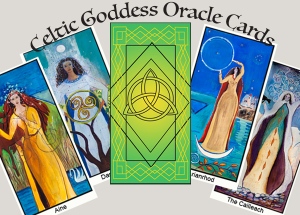 You can order your deck on Judith’s website. Experience the wisdom of the Celtic Goddesses!
You can order your deck on Judith’s website. Experience the wisdom of the Celtic Goddesses!


I’ve visited her house & stood at the gate,
and slept at the inn in Amherst —
as Thomas W. Higginson once had done.
Her garden & her home were all she had —
mystic & recluse to the end of her days.
Thus her mastery is beyond compare —
her reverie with the bee absolute ecstasy:
“Come slowly — Eden!
Lips unused to Thee —
Bashful — sip thy Jessamines —
As the fainting Bee —
“Reaching late his flower,
Round her chamber hums —
Counts his nectars —
Enters — and is lost in Balms.”
~ Emily Dickinson
LikeLike
Thanks for sharing this wonderful bee-inspired poem!
LikeLike
Reblogged this on Goddess Spiral Health Coaching and commented:
Judith Shaw’s quickly and powerfully connects bees to their physical and spiritual importance. I am reminded of how I grateful I am to bees every time I enjoy my favorite fruits. Bees and Goddess — What is your sacred connection to them?
LikeLike
Thanks for the reblog – spreading the word about our ancient and ongoing connection to bees one bee buzz at a time.
LikeLike
Thank you for taking the time to write this powerful piece Judith! I knew immediately that my sisters needed to read your words as soon as possible. I hope the connection continues. Blessings! <3
LikeLike
Brava! When I was writing Finding New Goddesses, I made the Blessed Bees our Found Good Neighbors:
The Blessed Bees are modern Good Neighbors. Like the traditional Other Ones—Fairies, Brownies, Elves, and the like—called Good Neighbors by those who (correctly) fear to offend them, the Bees are magical beings. They respond with honey-sweet blessings large and small when we cry out for assistance. Invoke them with these words and in your most mellifluous tones:
Twinkle, twinkle, Blessed Bees,
As I ask you grant it, please.
Wisdom, health, abundancies—
As I will’t, so mote it, Bees.
Slightly larger than the honeybees we’re accustomed to, the Blessed Bees are shining golden insects with crystalline wings. They live in the Golden Hive at the summit of a glass mountain, and Melissa, Their Devoted Beekeeper Priestess (who wears sturdy, non-skid shoes), lives nearby to serve Them. When They fly among us, the Bees carry tiny baskets, and among Their gifts to us are magical venom, pollen, propolis, beeswax, and royal jelly. Blessed Venom is used in “sting therapy” to get our attention in times of crisis, and Blessed Pollen provokes our souls to flower. Both the Blessed Bees and their relations in the mundane world have been traditionally seen as the bearers of peace, harmony, propriety, renewal, fertility, industry, and eloquence, all of which virtues They have since ancient times modeled for humankind.
In the center of the Golden Hive, surrounded by Her dancing swarm of Wonderful Worker Bees, lives the Blessed Queen, one sip of whose intoxicating honey makes the mortal mouth golden with wisdom both eloquent and endless. We’ve heard the granny tales, of course, and what child has not daydreamed of being one of those brave young heroes and heras who journeyed beyond the sun and the moon in order to seek out the Blessed Queen and serve Her for a year and a day? Some have actually gone to the Blessed Lands, and when they come back from the Land of Faerie, they’re always great talkers. Some of them, alas, also write books.
You are no doubt also familiar with the Lesser Magical Hymenoptera, the Blessed Spelling Bees and the Blessed Quilting Bees. Some would tell us that the former invented our alphabets. It’s certainly true that the Overlighting Spirits of Copyediting and Proofreading seem to have dispatched the Spelling Bees to their liturgists [like me], and we can only hope that Spelling Bees will also seek out our computer spell checkers and inject them with Royal Word Jelly. The Quilting Bees, They Who Inspire Craftspersons, possess innumerable talents that include all facets of interior design, decoration, and feng shui. Loyal subjects of their queen, Martha Stewart, they create Good Things and are often found in gatherings with the Blessed Arachnids, whose weavings, knittings, crochetings, tattings, macramamayings, and embroiderings bedeck our homes.
It has long been known that the Good Neighbors tend to have a skewed sense of humor. It is this fact that has inspired the famous New Age adage, Be careful what you wish for because you may get it. This is good advice indeed. The Blessed Bees may be our friends, but They also have our highest good in mind, even when we don’t. If They disapprove of your request, therefore, They may decide to surprise you. Ask for a million dollars, and you may find yourself facing opportunities to give a million dollars to people whose needs are greater than yours. It is a fact, for example, that numerous petitioners have been forced to watch public television pledge drives until they ante up.
Some of us feel—correctly—that people on the Red Path (those earnest New Age Seekers sometimes unflatteringly referred to as Wannabes) should not have a monopoly on guidance from the animal world. We therefore consider the Blessed Bees to be Pagan Power Animals. If you decide to call Blessed Bee Medicine into your life, therefore, you have a number of options. These include meditating on Blessed Beesyness, shamanic traveling up the Tree of Life and into the Golden Hive, planting a Bright Bee Garden, building a Bee Shrine and feeding the Bees, and dreaming under the Honeymoon.
LikeLike
Barbara, thanks so much for sharing your tale of the Blessed Bees our Found Good Neighbors. It is so charming and uplifting with wonderful turns of humor.
I might add that the smell of the honeybees is also wonderful. My hive is in my shed right now (my bees did not make it through the winter) and every time I open it I am greeted by the sweet smell of honey and beeswax.
LikeLike
Barbara, I love your Blessed Bees! I really must buy your book soon!
LikeLike
Barbara, I love your humor!!! Laughing, at ourselves if need bee, is the best medicine.
LikeLike
Great post, and great paintings too!
LikeLike
Thanks NIck
LikeLike
My Pepperwood tree becomes loaded with tiny white flowers that the bees love. With the sun on it, the tree glimmers from their wings. I may live in the desert, but Brigid’s presence is strongly felt.
LikeLike
Judith, thanks for your great post and paintings. I’ve always been fascinated by bees. When I was a teen I bought a hive, but the ants drove them off. I’ve considered getting a hive again, but I live in Maine and I think it would be a lot of work to keep a hive here. So I’ll just content myself with watching the wild bees in my garden and fields.
LikeLike
Beautiful post and gorgeous paintings! Thank you! Here is a favorite stanza of mine about bees from a poem by Antonio Machado:
Last night as I was sleeping,
I dreamt—marvelous error!—
that I had a beehive
here inside my heart.
And the golden bees
were making white combs
and sweet honey
from my old failures.
LikeLike
jkmcgarrie I know what you mean about how beautiful the bees look while gathering their pollen. I also love seeing them with their little legs loaded with yellow pollen as they wander about almost drunk with nectar.
Linda, I am a new beekeeper – two years in. I haven’t had success yet (first hive destroyed by wax moth worms – 2nd hive didn’t make it through the winter). But I so love seeing them coming and going and they help my garden be so much more than it was before their arrival. I’m sure it must be a challenge for a hive to survive the very cold winters you guys get in Maine.
Darla, thanks for sharing the poem. Our Blessed Bees do inspire don’t they?
LikeLike
I worry so about the death of bees, which will be the death of life, yet no one seems capable of stopping the chemical pesticide industry. A silent spring indeed. Bzzzzz
A major threat to bees comes from the toxic chemical pesticides used in agriculture. Several pesticides are real bee-killers, especially the ones from the chemical group called the “neonicotinoids”. Neonicotinoids can cause acute and chronic poisoning with deadly consequences for individual bees and entire colonies.
This could occur in the fields when bees fly through clouds of pesticides or in their hives when they feed baby-bees with contaminated nectar and pollen.
In addition to bee-killing pesticides, bees are weakened by climate change, parasites and the increasingly monotonous landscapes created by intensive agriculture that lead to a loss of biodiversity, availability of food and undisturbed habitats for wild bees and other pollinators.
http://sos-bees.org/
LikeLike
I worry also Carol. Sometimes its hard to keep a positive feeling with the constant and ongoing destruction to our Mother Earth – to Her very body upon who we rely for our own existence.
Everything you say about the bees is true. Another terrible cruelty is the way the are worked to death in toxic fields by the commercial beekeepers. Large commercial operations truck their hives around the country from almond trees to apple trees working them year round. The almond groves are some of the most heavily sprayed of all our crops apparently and the bees are busy there injecting poison with the pollen during the winter months when they should be resting. They often die of exhaustion.
And if they are not killed directly by the Neonicotinoids then they are severely weakened and unable to withstand various illnesses that can affect a hive. More and more often I read about small commercial beekeepers (the type who stay put with their hives) having to fold up shop because they keep losing their bees.
I also heard recently that the Monarch butterfly is nearing extinction. What a loss! Both the butterfly and the bee, sacred to Goddess, are so intriguing and have such amazing lessons to teach us. Will we wake up to the peril of our ways in time? That is the big question isn’t it?
LikeLike
I still have a book my mother followed – Dr Jarvis and New England Folk Medicine. Much of it seems to contain apple cidar vinegar and honey. I am fortunate to have a local bee keeper, and lots of small local family farms that don’t spray everything with poison. Fortunate indeed, I use honey instead of sugar, and love every bee that appears in my garden. Thank you for this wonderful post.
LikeLike
I have had many wonderful journeys with this Goddess; Sweet Merope, the Honey Faced, Mylitta the Great Queen. Thank you for sharing your words and images.
LikeLike
Lovely post, Judith. Our echium are in full bloom here in SF Bay Area, and the bees are swarming all over the flowers. I enjoy watching them (and the hummingbirds) buzz and gather their pollen through our living room window as I sip my tea in the afternoon. What blessings the industrious little bees are to us and this world. Thank you for honoring the Bee Goddess this Spring. As we all work to find ways to protect the bees may we, indeed, “honor cooperation, harmony and work well done.” Jenna
LikeLike
IB – I’m not familiar with Sweet Merope. I’ll have to look Her up. There are so many, many wonderful Goddesses for us to explore.
Jcowles – such a blessing isn’t it – watching the bees and all the other pollinators.
LikeLike
Judith, I create a temple for Merope on my blog years ago if you’re interested. http://www.allthingsaregoddess.com/p/goddess-temples.html Cheers!
LikeLike
lb – very nice!! Thanks for sharing.
LikeLike
Wonderful post, Judith. Bees are important to me (and to all of us), and the bee goddesses are an important part of my pantheon. Thanks for singing their praises!
One thing that most people don’t know is that honeybees were imported from Europe in several waves since the early colonies. These are not native bees, so they are probably more susceptible to a variety of threats than the native bees that evolved here.
LikeLike
Nancy, thanks for sharing your thoughts and for praising the honeybee.
Though it is true that honeybees are not native to the Americas and were imported here by the Europeans, I do think there is something else going on concerning bee disappearance and colony collapse than the issue of native or not.
They seemed to be doing just fine for a few hundred years until recently. Also the honeybees are suffering in Europe.
LikeLike